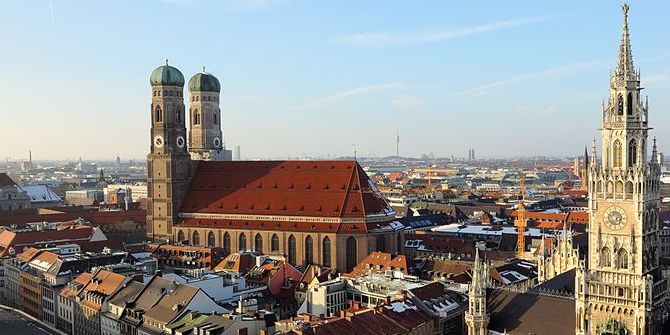As Tobias Cremer outlines, to understand this regional phenomenon it is essential to focus on specific national contexts. In Bavaria, most of the voters to have abandoned the Christian democrats moved left to the Greens rather than to the AfD on the right. Tobias explains that, in Germany, the mainstream churches are outspoken in their condemnation of such movements and have the social capital to influence the electorate. These conditions exist in many, but not all, Western nations.

Tensions were running high in Munich’s Maximilianeum on the evening of Sunday 14 October 2018. Bavaria’s conservative Christian Social Union (CSU) was holding its election event in the state parliament building after several weeks of gloomy election forecasts. Pollsters had predicted less than 40% of the vote for the party, which traditionally scored well over 50% in Germany’s most Catholic state. Even more disconcerting for the CSU was that Germany’s far-right Alternative für Deutschland (AfD) was predicted to achieve a record result of 15%. Partly in response to such predictions, in the months leading up to the election the CSU had attempted to co-opt some of the AfD’s strategies. In particular, it had copied attempts to politicise Christian symbols as cultural identity markers (a method fittingly described by Olivier Roy on this blog) by ordering the display of crucifixes in public buildings “not as religious symbols (…) but (as) a profession of identity and Bavaria’s cultural legacy”, as Minister President Markus Söder put it. While bishops condemned this culturalised (ab-)use of the cross, CSU strategists, haunted by the fear of losing their Catholic constituency, paid little heed to such warnings.
The results of the election showed that their fear was not unfounded: with 37% of the vote the CSU achieved its lowest score since 1950, and of the 530,000 voters who had deserted, 54% said they had done so because “the CSU had given up on its Christian convictions”. However, to the surprise of many observers the majority of these voters had not migrated to the AfD as expected, but had voted for the left-wing liberal, pro-migration Green party.
Though perhaps counter-intuitive at first glance, the Bavarian results are representative of mainstream churches’ and Christian voters’ reactions to the new right’s religiously-laden identity politics throughout Western Europe. Several studies have found that Western European Christians tend to be empirically more “immune” to voting right-wing populist than irreligious voters. Thus, in the Netherlands Geert Wilders and his right-wing populist Freedom party perform best among secular voters, in Denmark 98% of the supporters of the Danish People’s Party stated that they never or rarely attended church, and in Italy or France, church attendance is one of the strongest predictors for not voting for a right-wing populist party. However, this “religion gap” is perhaps most pronounced in Germany. The AfD has, in spite of its forceful references to Germany’s “Christian traditions” and “Judaeo-Christian identity”, consistently scored only about half as well among Catholics and Protestants as among irreligious voters. Therefore, by attempting to copy right-wing populists’ use of religion, the CSU seems to have fallen victim to the same “vaccination effect” that hindered the AfD’s success among many Christians.
But what are the reasons for this paradox between right-wing populists’ religiously-laden rhetoric and their relative lack of popularity among the faithful? As previous authors in this blog series have emphasised, right-wing populists seem to be more interested in “Christendom” as a culturalised identity marker (primarily directed against Islam), than in “Christianity” as a faith. One potential explanation is, therefore, that personal commitment to universalist Christian values might instil an inner resistance to exclusivist right-wing populist attitudes Yet, while some studies have found that Christians are more tolerant of foreigners than their secular neighbours, others, such as the 2018 Pew survey, have suggested the reverse, and many studies conclude by finding no significant difference in attitudes. Another possibility is to point to the role of mainstream (particularly Christian-Democratic) political parties, which by traditionally binding Christian voters to them, have made these voters ‘unavailable’ to right-wing populist parties. However, while party allegiance may go a long way in explaining this phenomenon, it fails to account for why Christian voters sometimes appear to reject right-wing populist policies, even when they are propagated by mainstream parties such as the CSU.
Instead, a third but often-overlooked factor behind the “religion gap” may be the behaviour of the institutional churches themselves. For instance, Andreas Püttmann, one of the most prolific commentators on the relationship between Christianity and the far-right in Germany, argues that Germany’s mainstream churches have been able to erect a powerful social taboo around voting AfD. Thus, by positioning themselves clearly in the pro-immigration camp, demonstrating at AfD party conferences with provocative slogan’s such as “our cross has no hooks” (the German word for swastika is literally translated as “hook cross”), or by excluding AfD politicians from speaking at the national church days, Germany’s churches have become some of the party’s most robust public adversaries. As a result, affection for the new right is associated with significant social costs among church members. And since Germany’s church-friendly constitutional system endows the churches with a comparatively high social status throughout society, such measures also matter beyond the practicing flock. Similar dynamics can be observed in countries like France, Italy or Austria. By contrast, in countries where churches are less outspoken, such as the US or Poland, or in regions where the churches are institutionally less powerful, the “religion gap” appears to be much weaker or is limited to frequent church-goers.
Crucially, the behaviour of the churches also seems to have a powerful effect on the behaviour of right-wing populist parties themselves. Germany’s churches, for instance, have not only helped to strengthen the social firewall between ‘respectable society’ and the populist right, but also to discourage the latter from using religious rhetoric and symbols in the first place. Following the churches’ strong opposition, the AfD has increasingly distanced itself from earlier pro-church positions, denouncing the churches as “government spokesmen” (Beatrix von Storch), calling for a stronger separation of Church and State and stating that it is “not a Christian party” (Alexander Gauland). Similarly, in the UK, the Church of England’s strong pro-refugee stance and repudiations of earlier BNP attempts to instrumentalise religion may help to explain why neither UKIP nor the Leave campaign made any significant efforts to turn Anglicanism into a part of their appeal to English nationalism.
To be sure, reactions such as those of the AfD also demonstrate potential risks associated with the churches’ policy, as it may contribute to further social exclusion and radicalisation of far-right supporters, as well as to politicise Christianity. But they are also evidence of the tremendous potential that church authorities still command with regards to the use of religion in politics. Even in times of increasing secularisation and religious diversification, actors interested in attracting the (admittedly shrinking) Christian vote and combatting the right-wing populist challenge might be well advised to not just consult pollster gurus and political strategists, but also the position of the Church. Had the CSU listened more closely to clerics such as Munich’s Archbishop Cardinal Reinhard Marx, who repeatedly warned that a party with a “C” in its name should remember that “being nationalist and being Catholic does not work together”, the party may not only have received spiritual support on election night, but potentially gained some critical political insights as well.
Note: This piece gives the views of the author, and not the position of the LSE Religion and Global Society blog, nor of the London School of Economics.






5 Comments